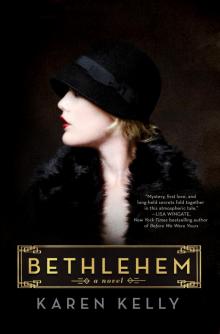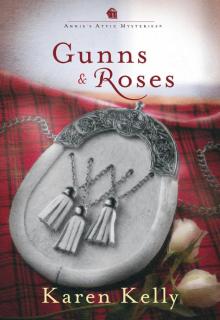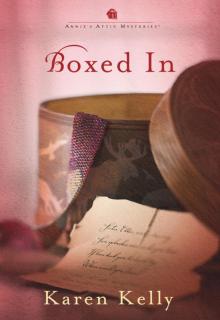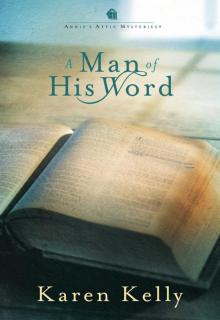- Home
- Karen Kelly
Bethlehem Page 17
Bethlehem Read online
Page 17
Thinking on her feet was becoming second nature, and Susannah took a bit of unscrupulous pride in her ready response. But her fiction wasn’t much of a stretch. Chap had improved their rustic environs with the addition of a stadium blanket and several plaid davenport cushions (the brothers at Chi Psi were still investigating), but the boathouse was a bit drafty, and so, in addition to supplying an extra blanket, he had gathered as much kindling as he could carry and attempted to light a fire in the rusty corner stove. What he hadn’t anticipated was the presence of some kind of nest that had fully and resolutely plugged the pipe. Eventually it burned away (with no evidence of inhabitants, to Susannah’s squeamish relief), but for most of the evening, an eye-watering haze had covered them more thoroughly than the blanket.
Moving toward the cloakroom, she glanced across the hall, happy to happen on a diversion. “The tree looks beautiful. It’s even bigger than last year, isn’t it? Ernst must have had quite a time.”
The Christmas tree was, indeed, enormous, and Ernst—the beleaguered head gardener—had had to haul in a heavy, cumbersome ladder in order to reach the top.
“Yes—a veritable sequoia.” Helen raised her brow dubiously. “Somehow he managed, but I wouldn’t get too close. One jiggle and you could be impaled by a falling star.” The precarious crowning glory of the tree was a traditional Moravian star with about twenty sharp points. “I think it would be best to place our gifts under the tree in the drawing room this year. And that reminds me: I picked up a little something for Wyatt today. I was in the city and Wannamaker’s had a lovely cashmere muffler in the exact shade of Yale blue. I just couldn’t resist.” She pursed her lips, thoughtful. “I’ll need to get something for Chap, as well. What, though?” The look she gave her daughter was enigmatic. “Any suggestions?”
Susannah blinked an extra time or two. “No … I … ah … wouldn’t know. Maybe the same thing in brown and white?”
Helen’s gaze was steady. “I think not. I’ve never particularly cared for Lehigh’s colors. Too drab. Perhaps you can think of something else he would like?”
Susannah’s bold insouciance was dissolving like chalk in the rain; suddenly she felt very warm. Grasping the cloakroom doorknob, she threw a casual response over her shoulder as she shrugged off her coat: “Sorry, I can’t help you there. Kit may have an idea—you could ask him when he gets home.”
“One moment.” Helen stepped forward and plucked a small dead leaf from the hem of Susannah’s coat. She held the bit of brown out to her daughter. “It seems the Smythes’ housekeeping leaves something to be desired.” Peering at Susannah’s hair, she reached up and extracted another betraying fragment from the wavy bob, and her words were as dry as the foliage: “No pun intended.” With that, she turned toward the staircase and walked away, teacup rattling on its saucer.
* * *
In her bedroom, Susannah sat down at the dressing table, wincing when she saw the telltale, rosy abrasion on her cheeks. As she drew a comb through her hair, another bit of leaf fell out. She made a mental note to find a broom and sweep the boathouse floor.
It wouldn’t be long now. To go public with their relationship before they broke it to Wyatt was out of the question. Compounding the injury with such an insult would be positively inhumane. But Wyatt was coming home in several days, and the evening had been spent (partially) discussing how to tell him.
“I have to do it first thing,” Chap had mused, stroking his hand softly over her hair as they lay before the sputtering fire. “I just can’t … I won’t be able to take it. I’ll go to the station—I can tell him in the car.”
But Susannah disagreed. “I think we should wait until after the holidays. Think about it. We’ll all be thrown together on Christmas Eve, and then at the country club for New Year’s. It would be better to spare him until after all that. Maybe just before he goes back to school. It will make it easier if he can get away.”
Chap gave a small, painful groan. “All right. But I’m not going to the club. Christmas will be hard enough.” He exhaled in a dispirited puff, muttering bleakly, “What a way to start the year.” For a few moments, the only sound was the crackling of the kindling, and then he spoke again—distilling the wretchedness of the situation to its essence with one grim thought: “I’ll want him to be my best man. How do you think that will go over?”
It wasn’t quite a proposal, but it didn’t need to be. Their future together was a foregone conclusion. It was only a matter of time.
“What about Itty? She still dreams about making you pancakes. I don’t imagine she’ll be the most honored of maids.”
Even the cold sleet of the conversation couldn’t douse the gleam in Chap’s eye as he moved over her, propping himself on his elbows. Through a small, pent smile his voice was throaty: “I like my pancakes with blueberries and syrup, and … this.” And then he covered her mouth with his, and the awful complications wafted into the lingering haze.
* * *
India was the first to come home. Jimmy had been sent to the city to fetch her. It was a trip that normally took no more than two hours each way, but a picturesque holiday snowfall had Helen pacing halls and peering out windows. The late-afternoon shadows were turning to dusk as the creamy Stutz pulled up the drive, and Susannah joined Helen at the front door to form the small welcoming committee. Using every performance skill she could muster, she plastered a cheery smile on her face. “Well, look here! City mouse come to call in the country!” To her ears, the words sounded a bit forced, but her mother’s bustling welcome provided a relieving buffer, and Susannah dropped back a step as Helen ushered her eldest daughter into the house and up the staircase.
After a routine homecoming exchange—the condition of the roads … beastly exams … a new dress from Bergdorf’s—Helen drifted off to see about some floral arrangements, and Susannah sat down on the bed in her sister’s room, struggling to maintain a semblance of the relaxed, easy bond they had always shared.
“It must seem so provincial here. I hope you aren’t bored to tears. It’s too bad Harold couldn’t spend the holidays with us. But Manhattan at Christmas is divine. I suppose he would find our little town of Bethlehem rather dull.” She was aware that she was rambling—something that had never really been her style—but her subconscious was working overtime pitching the big city, and—please, God—a prevailing love interest therein.
India was standing before the wardrobe changing her clothes, and her words were slightly muffled as she pulled a gray silk blouse over her head. “I broke it off with Harold.”
“Oh.” Susannah’s dismay was deeper than India could know. “That’s a shame.” Her eyes landed vacantly on India’s suitcase, which Jimmy had deposited there for the attentions of the new upstairs maid. “Was there … a particular reason?”
India gave her a weary look. “What do you think?” The question was rhetorical, and her eyes went to the floor as her shoulders fell. She stayed like that for a moment, lost in the despondent futility of it, and then shook her head sharply as she turned back to the wardrobe. “And the thing is”—her voice thickened as she squeezed a woolen skirt tightly with both hands—“there’s nothing wrong with Harold. He’s nice and smart and handsome … and I couldn’t even tell him why.” Framed on the inside of the enormous walnut doors were long mirrors. Although India had turned her back, Susannah had a clear view as her sister tipped her chin down, pressing her eyes shut. With a deep sigh, India managed to control her emotions. “Maybe I’m delusional, but I can’t help thinking that one day Chap will wake up and realize I’m the one.”
Susannah hoped her cringe wasn’t as pronounced as it felt, and the room hummed a little as she swallowed a good-size rock. “Well … um … Elvie’s making beef Wellington for dinner … and Hep said he’d take us driving while you’re back.…” She glanced rather desperately around the room, searching for another bright spot on which to focus. But nothing presented itself. “Although, if this snow keeps up, he probably won’t let
us behind the wheel.…” Her words trailed off and she stood suddenly, stroking her palms over the front of her skirt in a nervous swish. “I have a little headache—I’m just going to lie down for a bit.…” The vague feebleness of her voice gave credence to the words, but as she turned toward the door, India stopped her.
“Sassy, wait.” There was an eager lift to her brow. “Have you seen him? Has he come to dinner?”
Susannah managed a hollow response. “What? Oh … you mean Chap? Ah … no … he hasn’t come around. I guess he’s been busy at school.…”
“Oh. Well.” The little flicker of hope in India’s voice was snuffed to a sad, gray wisp. “I thought maybe Mother would have roped him in.”
“No. Just Charles.” Susannah almost made it through the doorway, but the gods weren’t finished with her yet.
“Do you think he’s seeing someone?” The question was more ruminative than anything—tortured speculation seeking a sounding board—but the color in Susannah’s face was draining away in a swirling vortex, and she could only pray it wouldn’t emit an actual gurgle as India continued her unwitting crucifixion. “I mean, I know he takes girls out, but do you think there’s someone special?”
She was looking for sisterly solidarity and a reassuring denial, and in another life, Susannah would have provided it. But that was in another life. Now her hasty fib was made real. “I’m sorry. I’m really not feeling well … I need to lie down.…” And to further prove the point, her knees buckled a little as she fled to her room.
* * *
The midnight Christmas Eve service at Nativity Episcopal Church was always overflowing—packed with bodies that hadn’t felt the hard seat of a pew all year. Gothic iron torchères mounted at intervals on the stone walls cast a mystical, flickering light over the nave, and the altar glowed with enormous candelabra and a tall Douglas fir decked in tiny candles. Susannah was seated—pro forma—in the front row, wedged between India and Kit. And directly behind her, emitting waves of heavy atmospheric pressure that pushed against her neck and shoulders, was Wyatt, flanked by his father on the right and Chap on the left. Her head was bowed as though in obeisance, but in fact she was staring at her hand. More specifically, at the milky, iridescent opal that was mounted in a gold ring on her finger.
Not surprisingly, Wyatt had appeared at the door the instant he got back. As Susannah came down the stairs, she registered a dim dismay at the realization that clichés are sometimes all too true: when he saw her, his eyes lit up. Harriet took his coat, and he embraced Susannah somewhat clumsily. The fact that overt displays of affection had never been Wyatt’s strong suit played well for her then—her stiff, puny response didn’t seem to register.
There was a nice fire going in the library, so they sat there on the small divan, where she tried her best to be warm and bright. But she was quickly realizing that Chap had been right about telling him immediately. She felt cheap and cruel, and she didn’t like pretending. She had always been authentic and forthright—until the past few months, that is. But her performance to date had only been a rehearsal—this was the real thing. Looking at Wyatt’s sweet, eager eyes, she found herself paralyzed with stage fright. And then those same eyes turned disappointed and confused as Susannah suddenly remembered a promise to do some last-minute Christmas shopping with India. So sorry … Here, don’t forget your hat.… I’ll see you later.… When she closed the door behind him, she thought she might cry.
The following days were an awkward blur of evasions and contrivances—busy errands that just had to be done, and tasks and obligations and anything at all that would keep Wyatt at arm’s length. But in her counterfeit litany of excuses, the one true thing was that she wasn’t feeling well. At first she thought it had to be the flu. But it seemed to come and go, and eventually she decided that the cause of the roiling nausea was more likely emotional than physical. By Christmas Eve—despite herself—her stomach had settled; while there was still a large knot there, at least the queasiness had passed. She had finished doing her hair and was about to make herself choose a gown to wear when her mother knocked lightly and opened the door.
“I hope you’re feeling better.” Helen was dressed festively in a sweeping burgundy moiré skirt and a Chantilly lace blouse with a poinsettia brooch near the collar. “Alvin is serving champagne in the drawing room, and the fire is roaring.” She stepped up to Susannah and laid the back of her hand across her daughter’s forehead.
“Mother, really.” Susannah pulled her head away sharply. She hadn’t meant to be short, but jittery nerves bested her. “I’m fine—I was just going to change. I’ll be down in a few minutes.” She turned toward her dressing table, trying to sound casual. “Are they here yet?”
She was dying to see Chap. She needed him. She needed the grounding assurance she felt when they were together. The last days had proven it—beyond the anguish she felt about Wyatt, she had discovered another misery: the enforced separation from Chap had left her feeling adrift and melancholy. It was like homesickness—like when, as a child, she had gone to stay with Grandmother Avery in Boston. Despite weeks of eager anticipation, she had been bewilderingly sad the entire time.
“Not yet. I expect them any moment. You know how prompt Charles is. As I’ve always said, it’s one of the best things about engineers—sticklers for precision.” She looked at the small gold watch that hung constantly from a long, slender chain around her neck. “I told Elvie we would be serving at nine o’clock. There’s still plenty of time for drinks and gifts before dinner.” Moving to the wardrobe, she opened a door and began to survey the dresses. “This midnight velvet would look nice, I think.” With a light grasp, she pulled the skirt forward, then moved on, running a hand across the hangers and making small talk as she considered the choices. “I do hope Charles doesn’t feel obligated about the gifts. It’s really a woman’s territory, don’t you think? Frances was so clever about it. Do you remember the year she brought the peanuts?”
For the first time in days, Susannah smiled honestly. “We were completely stymied. A bag of peanuts for each of us, tied up with a red bow. I can still hear Kit”—her voice went deadpan—“Oh, peanuts. That’s great.… I love peanuts.” She was grinning now. “The look on his face.”
“I’m afraid you all had the same expression. Frances was practically apoplectic trying not to laugh.”
“And then she had to make us open them … Go ahead—have some. Here’s a dish for the shells.”
“And the circus tickets were inside.” Helen was shaking her head, smiling at the memory. “Oh, she was such fun.” She pulled out another dress—pale green satin—and held it up appraisingly as she continued. “I tell Charles every year that he shouldn’t burden himself, but I just can’t let go of the gifting tradition. It would feel like one more thing gone with Frances.” Examining the dress, her tone became studiously nonchalant. “Did I mention I found something for Chap? It’s a new book of essays—just released. All the best of the year. Inge, Wells, Anderson … it looks marvelous. I hope he doesn’t have it.” She gave Susannah an innocuous look. “What do you think?”
Susannah was suddenly very tired of the game, and just wanted to surrender. With a small sigh, she looked directly into her mother’s eyes, and her even, flat delivery spoke volumes: “I think he’ll like it very much.”
They stood like that for a long moment, gazes locked, and then Helen turned abruptly back to the gown. “Good. Well, then … I think this would be a lovely choice. It’s a good color for you.” She settled the hanger on top of the wardrobe door and started toward the hall. But in the doorway, she stopped and turned back, her words soft. “When I was a young woman, my father said something to me that I’ll never forget. At the time, it made all the difference. He said: ‘I’m never here to judge you—I’m only here to help you.’” Her smile was tender. “Merry Christmas, Sass.”
* * *
“Merry Christmas, Hedy. I’m not much good at this—color-blind, and all—but the sa
lesgirl tried her best.” Charles gave a self-deprecating shrug as Helen opened his gift. It was a leather handbag from the saddler Hermès. “I’m told they’re all the rage in Paris.”
“I heard they had started producing ladies’ handbags—isn’t this sporty and smart!” Helen was holding the bag up, turning it this way and that. “Just think how useful this will be. I believe I could carry my entire ledger in here.” She smiled broadly at Charles, and then looked coyly at her husband. “Hep, just think of all the fine purchases I can make with the checking book in hand.”
Hollins rolled his eyes. “Wonderful, dear.” He turned to his friend with a grimace. “Strong work, Charles. A new and efficient way to deplete the coffers.”
“Always happy to help.”
The Yale-blue muffler and the book of essays were both received with earnest approval, and Charles jauntily donned his gift—a plaid trilby, perfect for pheasant hunts. He gave Hollins a bottle of aged port and a box of Cuban cigars; and for Kit, India, and Susannah, each a framed photo from a day long ago—a boating excursion on the river. It had been taken by an employee at Bethlehem Steel, eager to master a new camera. He had positioned his tripod on the shore and was trying to capture a shot of a great blue heron when the group floated by.
There was a moment of silence as they collectively regarded the image—Kit and Chap, grinning with chests puffed out and arms around shoulders; India and Susannah in pale summer dresses, waving from the bow; Charles and Hollins in straw boaters, grasping large oars; and Wyatt, seated low on a cushion next to Frances, who was leaning back as Helen held a parasol above them.
“I was cleaning out my desk at home and found the negative. Remember that fellow Fredrickson? Plant manager at Number Eight, I think. Gave it to me years ago, and I’d forgotten about it.”

 Bethlehem
Bethlehem Gunns & Roses
Gunns & Roses Boxed In
Boxed In A Man of His Word
A Man of His Word